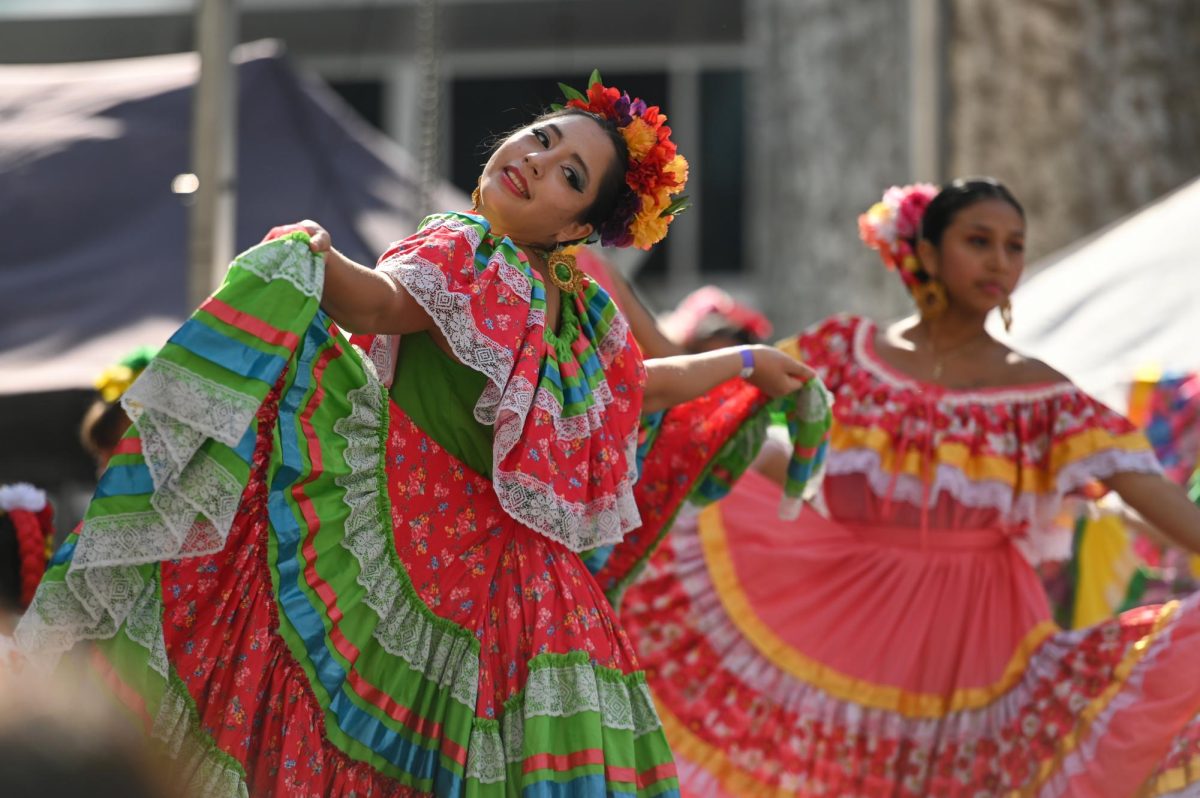
Diego Melchor
Mexican folklórico dance group Flor de Hidalgo perform a traditional dance during La Fiesta del Pueblo at Fayetteville Street Historic District on Sunday, Sept. 21, 2025. The event, which draws thousands annually, is organized by El Pueblo to celebrate the pride and resilience of the Latine community.
La Fiesta del Pueblo transformed the streets of downtown Raleigh into a celebration of cultural heritage and pride in a daylong gathering of vendors, games, educational entertainment and more.
The event is put on each year by El Pueblo, a nonprofit organization dedicated to amplifying the voices of the Latinx population in North Carolina through social justice and community organizing. The event spanned more than a half-mile on Fayetteville Street and was open to the entire Raleigh community.
From its humble beginning at the parking lot of Chapel Hill High School, the event has come a long way.
Melissa Cervantes, the digital organizer for El Pueblo, spoke about how the event has grown with the Latinx community in Raleigh and how it became what it is today.
“I feel like La Fiesta del Pueblo has kind of grown with the community,” Cervantes said. “In Raleigh, this event is our 31st La Fiesta del Pueblo. It started, you know, when the Latino community was really small here,” Cervantes said.
In the second year of the festival, it was moved to the cafeteria of the high school to allow for performances by Latino artists. Now in its 31st year, the festival boasts a large main stage at the end of Fayetteville Street with a list of musical and visual Latinx artists performing.
“We’ve seen the festival grow and change with the community. We’ve had many iterations,” Cervantes said. “We’ve been, for many years now, here in downtown Raleigh, which is awesome to be in the heart of downtown and in North Carolina’s capital.”
Cervantes said how much the event means this year, with the growing number of changes in the political climate concerning the Latinx community both in North Carolina and across the country.
“It’s super important to have these events to show people that our community is strong and vibrant and that we’re present,” Cervantes said. “I think a lot of political moves are trying to scare folks and also, kind of, erase people. So I think that’s one of the reasons why this event is so important.”
Katherine Cruzado, a volunteer at the event, said the event celebrates heritages from all Latin countries. The vast number of vendors and performers brings culture from all over Latin America.
“This event just means a lot to me, just because it showcases a lot of the countries that a lot of people kind of tend to pass by,” Cruzado said. “It shows the beautiful culture, shows the food, it shows all the authentic items that meet and mean a lot to our parts in the end.”
Norma Martí, former development director at El Pueblo and current volunteer, also spoke about what the event has meant to the Latino community and how that has progressed over time with the El Pueblo organization.
“It was our way as Latinos in North Carolina, saying we’re here, you need to see us. You need to respect our heritage and what we bring to this state.” Martí said. “I’m really proud to see that we have not just this big fiesta in Raleigh, because it’s a capital city, but we have them in Winston-Salem. We have them in Morehead City, in Carteret County.”
El Pueblo does much more than hold this fiesta and other events in the Triangle. Events like the fiesta invite community members to learn more about how the government works and how to make themselves heard when it comes to policies affecting their community.
The organization has a vast mission throughout the state, focusing on education, physical and mental health, as well. Community outreach is one of the organization’s main focuses, getting people involved through events regardless of size.
“We do a lot of outreach in the community, currently still with community health workers who will go to the homes and trailer apartment complexes to bring education to the family,” Martí said. “It’s whatever the education may be, we just survived COVID, so they were out there doing a lot of COVID education and vaccination scenarios.”
Martí said that she thinks the food is one of the best ways for attendees to get to know different cultures at the fiesta.
“You’ve got to try the food. You don’t know a culture unless you have tasted the food. I mean, dancing, I could teach you a little salsa today. But you know, food, it’s what you give people when you love them. Your parents, your mama, gave you food, right?” Martí said. “And so I think getting to know a culture, getting to know and not just the tacos, no, no offense to my Mexican friends, but there are other food carts here from other countries, and it’s just amazing.”